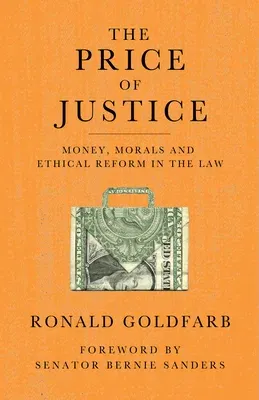"Attorney and literary agent Goldfarb (editor, After Snowden)
delivers a lacerating critique of inequities in America's criminal and
civil justice systems and the role of lawyers in perpetuating them...
Legal professionals will want to take note." - Publisher's Weekly
With foreword by Senator Bernie Sanders
Real civil and criminal justice is long overdue
The Price of Justice: Money, Morals and Ethical Reform in the Law
veteran Washington Lawyer Ronald Goldfarb reveals the injustices in our
legal system and how money and power have exceeded ethics in the legal
profession for far too long.
Justice reform has become an increasingly present topic in the news and
media, with movements like "I Can't Breathe" and Black Lives Matter
prompting national outcry from the public over the unethical actions of
law enforcement, and remains one of the most controversial and highly
debated issues for politicians and citizens today. With more than 2
million American's incarcerated, it is beyond apparent that the justice
system intrinsically ensures that lower-income people and minorities are
shockingly under represented and offered little to no legal protection.
In The Price of Justice, Goldfarb uses powerful testimonies, media
evidence, and first-hand expertise from working in the Justice
Department as a longtime public interest lawyer to reveal how both the
criminal and civil justice systems fail to serve lower and middle-class
citizens, and makes an undeniable case for the profound justice reform
that is so desperately needed. Goldfarb asks that we examine closely a
legal system that has become largely pay-to-play, benefiting the
administrators and those wealthy citizens who can afford to "lawyer up",
and shows little mercy for the lower-income citizens who fall victim to
an endless cycle of conviction, fines, bail, lack of counsel and capital
punishment.
Goldfarb exposes a system that values money over ethics and lawyers who
value winning cases over finding truth and serving justice, pointing out
that civil aid and public defenders are grossly under-staffed and under
financed, making it nearly impossible to meet the challenges of
well-paid private lawyers. This book begs the legal profession to
consider it's ethical code when considering cases to represent, not just
represent crooks who can pay and turn away worthy clients who cannot
afford exorbitant fees, and equips the public with the knowledge needed
to advocate for real justice reform.

